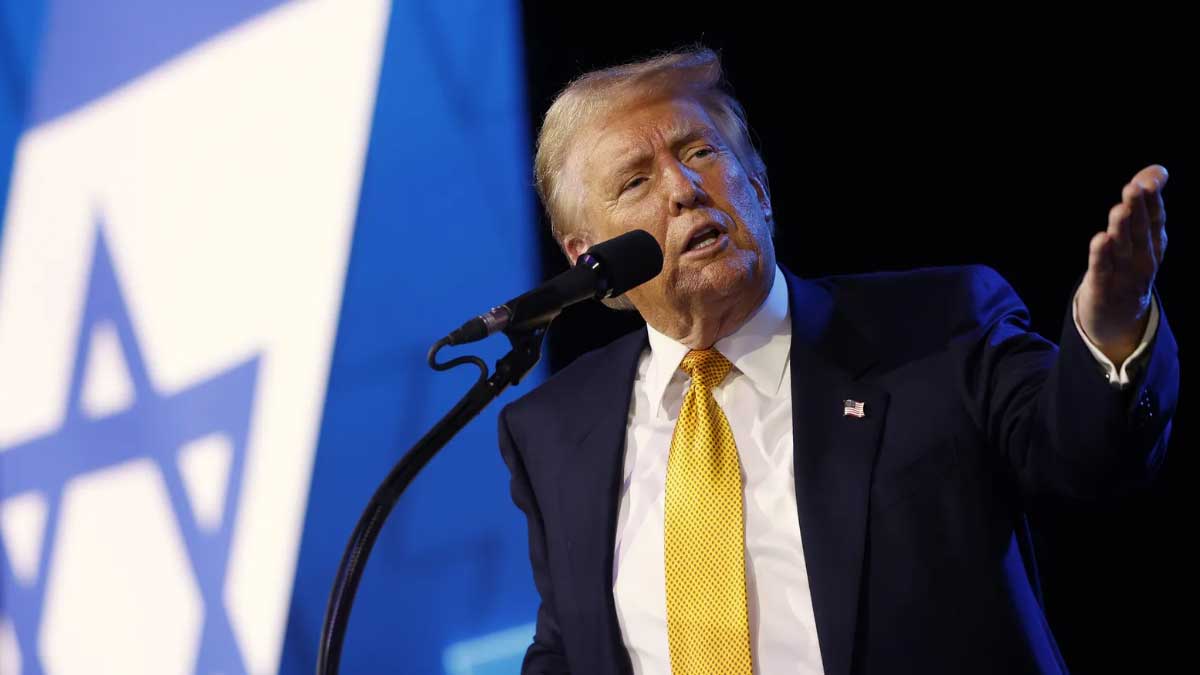- Home
- Billionaires
- Investing Newsletters
- 193CC 1000
- Article Layout 2
- Article Layout 3
- Article Layout 4
- Article Layout 5
- Article Layout 6
- Article Layout 7
- Article Layout 8
- Article Layout 9
- Article Layout 10
- Article Layout 11
- Article Layout 12
- Article Layout 13
- Article Layout 14
- Article Sidebar
- Post Format
- pages
- Archive Layouts
- Post Gallery
- Post Video Background
- Post Review
- Sponsored Post
- Leadership
- Business
- Money
- Small Business
- Innovation
- Shop
Recent Posts
Trump Warns Jewish Voters Could Cost Him 2024 Election

Former President Donald Trump made headlines Thursday at a “Fighting Anti-Semitism in America” event organized by the Israeli-American Council in Washington, D.C. During the event, Trump suggested that if he loses the upcoming November election, Jewish voters will bear a significant part of the blame. His remarks, focused on the political leanings of Jewish Americans, underscored his frustration with Jewish voters who support the Democratic Party.
In his speech, Trump did not hold back from voicing his long-standing grievances, reiterating his belief that Jewish voters who back Democrats, particularly Vice President Kamala Harris, are making a significant political misstep. “It doesn’t make sense,” Trump said, referring to the fact that a majority of Jewish voters have historically favored Democratic candidates in U.S. elections. According to the former president, the Jewish electorate should overwhelmingly support him, given his administration’s policies on Israel.
Trump pointed to key moves he made during his presidency that directly impacted Israel, such as moving the U.S. Embassy from Tel Aviv to Jerusalem—a decision that sparked international controversy but was praised by many pro-Israel groups. He also cited his administration’s recognition of the Golan Heights as Israeli territory, a region that has been the subject of decades-long disputes between Israel and Syria. Despite these significant steps, Trump expressed dissatisfaction, stating that Jewish voters had not treated him “properly” in return.
He went further, suggesting that if Jewish voters were to support Harris, it would be a severe blow not only to him but to the nation and Israel. “The Jewish people would have a lot to do with a loss,” Trump said, adding that Jewish Americans who plan to vote for Harris “should have their head examined.” He suggested that Jewish support for Democrats may be a deeply ingrained habit rather than a well-considered political choice. “I find it hard to believe, part of it is a habit, I think,” he remarked.
Trump’s speech included a bold assertion that he should be receiving 100% of the Jewish vote. Instead, he lamented that this wasn’t the case, attributing it to what he described as the “Democrats’ hold or curse” on Jewish voters. Throughout his address, the former president repeatedly claimed that 40% of Jewish voters supported him, although he didn’t provide a specific source for this statistic. “That means you got 60% voting for somebody that hates Israel,” Trump said, referring to Harris, though no evidence supports the claim that Harris harbors anti-Israel sentiments.
A Pew Research survey conducted earlier in the month provided a clearer picture of Jewish American political preferences, showing that 65% of Jewish voters currently back Harris, compared to only 34% for Trump. This discrepancy between Trump’s claims and polling data did little to temper his rhetoric. He called the November election “the most important election in the history of Israel” and, in a highly unusual remark, appealed directly to Israel to intervene. “You have to defeat Kamala Harris… And I’ve never said this before… More than any other people on Earth… Israel has to defeat her. I really believe that. It’s a disaster for Israel, and you know why.”
These remarks are in line with Trump’s previous comments regarding Jewish voters and their political leanings. He has long touted himself as the best friend both Israel and Jewish Americans have ever had, frequently pointing to his administration’s actions in favor of Israeli interests. However, Trump has also faced criticism for his rhetoric, which some say perpetuates anti-Semitic tropes. His suggestion that Jewish voters who support Democrats do not “like Israel too much” or that they “hate Israel” and “hate their religion” has raised concerns among many, including Jewish advocacy groups.
Trump’s criticism of Jewish Democrats dates back years, and his frustrations have only grown more vocal during his 2020 and 2024 campaigns. In 2019, he sparked controversy by stating that he believed Jewish Americans who voted against him were showing disloyalty to Israel. He has continued to use this line of argument throughout his current campaign, questioning the loyalty of Jewish Democrats and accusing them of working against the interests of both Israel and their faith.
Critics have condemned Trump’s statements, accusing him of stoking dangerous stereotypes about Jewish dual loyalty to both the United States and Israel. This accusation is rooted in a long-standing anti-Semitic trope that has been used to question the allegiance of Jewish citizens in various countries. Trump’s remarks are seen by some as reinforcing this stereotype, which could potentially lead to further divisions and tensions within the Jewish community and American society at large.
Most recently, Trump faced backlash for a remark he made about Pennsylvania Governor Josh Shapiro, calling him a “highly overrated Jewish Governor.” This comment drew swift condemnation from the White House, as well as from Jewish organizations that decried the former president’s attack as both inappropriate and offensive.
Trump’s rhetoric on Jewish voters, Israel, and his political opponents remains a flashpoint in his campaign, raising questions about how his comments may impact Jewish Americans’ support for him in the upcoming election. His appeals to Israel and his harsh criticism of Jewish Democrats underscore his belief that his policies, particularly regarding Israel, should translate to more widespread Jewish support in the U.S. Whether this strategy will resonate with Jewish voters or further alienate them remains to be seen, but Trump’s insistence that Jewish voters have a pivotal role to play in the outcome of the 2024 election is clear.
As the election approaches, Trump’s message to Jewish Americans remains focused on his perception of loyalty, Israel, and political alignment. Whether his remarks help or hinder his chances with Jewish voters will become apparent in the weeks leading up to November.
Recent Posts
Categories
- 193 Countries Consortium Partner1
- 193cc Digital Assets2
- 5G1
- Aerospace & Defense48
- AI37
- Arts3
- Banking & Insurance11
- Big Data3
- Billionaires1,261
- Boats & Planes1
- Business332
- Careers13
- Cars & Bikes79
- CEO Network1
- CFO Network17
- CHRO Network1
- CIO Network1
- Cloud10
- CMO Network18
- Commercial Real Estate7
- Consultant1
- Consumer Tech194
- CxO1
- Cybersecurity73
- Dining1
- Diversity, Equity & Inclusion4
- Education7
- Energy8
- Enterprise Tech29
- Events11
- Fintech1
- Food & Drink2
- Franchises1
- Freelance1
- Future Of Work2
- Games149
- GIG1
- Healthcare79
- Hollywood & Entertainment203
- Houses1
- India’s 1000 Richest1
- Innovation46
- Investing2
- Investing Newsletters4
- Leadership65
- Lifestyle11
- Manufacturing1
- Markets20
- Media327
- Mobile phone1
- Money13
- Personal Finance2
- Policy569
- Real Estate1
- Research6
- Retail1
- Retirement1
- Small Business1
- SportsMoney42
- Style & Beauty1
- Success Income1
- Taxes2
- Travel10
- Uncategorized13
- Vices1
- Watches & Jewelry2
- world's billionaires1,230
- Worlds Richest Self-Made Women2
Related Articles
South Korea Plane Crash: A Tragic Loss and Global Mourning
The tragic plane crash at South Korea’s Muan International Airport on Sunday...
By 193cc Agency CouncilDecember 30, 2024H-1B Visa Debate Splits Trump Allies and Silicon Valley
The debate over H-1B visas has once again become a contentious issue,...
By 193cc Agency CouncilDecember 28, 2024Trump Moves $4B Stake in Truth Social Parent, Stock Drops 6%
Donald Trump recently transferred his 57% stake in Trump Media & Technology...
By 193cc Agency CouncilDecember 20, 2024House Rejects Trump-Backed Funding Bill, Shutdown Looms
The U.S. House of Representatives rejected a new government funding bill on...
By 193cc Agency CouncilDecember 20, 2024















Leave a comment